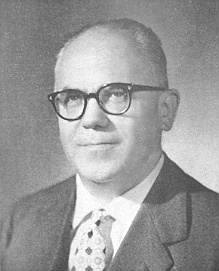Giulio Pastore
( politician, labor leader) | |
|---|---|
 | |
| Born | 17 August 1902 Genoa, Italy |
| Died | 14 October 1969 (Age 67) Rome, Italy |
| Nationality | Italian |
| Religion | |
| Party | Christian Democracy (Italy) |
Italian anti-communist labor leader and Christian Democrats politician who attended two Bilderbergs in the 1950s
| |
Giulio Pastore was an Italian resistance fighter, trade unionist and politician from the Christian Democrats. He attended the 1956 Bilderberg and October 1957 Bilderberg meetings.
A Catholic activist, he was the first general secretary of the Christian Associations of Italian Workers (ACLI) and then the founder of the Italian Confederation of Workers' Unions (CISL), set up in opposition to the communist dominated main trade union. He was also a deputy for Christian Democracy and minister between 1948 and 1968 in charge of the Cassa del Mezzogiorno, a fund to develop the southern part of the country, that became a major patronage slush fund for the Christian Democrats.
Background
Born in a family of textile industry workers, he organized, as a textile worker himself, unions of Christian inspiration until 1924, and directed the newspaper Il Cittadino until 1927[1].
He was militant in the youth movements of Catholic Action. He took part in the Italian Resistance after 1942 and was arrested by the fascist government[2].
Post-war career
He joined the Christian Democracy party and as organizational secretary he managed the electoral campaign in the 1946 elections for the Constituent Assembly.[1]
At the liberation, he took part in the signing of the unity pact which gave birth to the Italian General Confederation of Unitary Labor (CGIL) in June 1944. He became one of its leaders, representing the Christian tendency which achieved only 13.4% of the votes at the Congress of Florence in 1947[3].
He obtained the presence of his union at the London conference of March 1948 on the Marshall Plan. Very soon Giulio Pastore, in particular following the general strike proclaimed by the social-communist majority of the trade union secretariat, after the assassination attempt on the communist leader Palmiro Togliatti on 14 July 1948, became convinced of the impossibility of collaborating between components so mutually hostile. The Christian faction allied themselves with the other centrist minority currents of the CGIL under the impulse of Pastore. Pastore, under the influence of the United States, denounced the communist hold on the union, which he left on July 22, 1948 to found the LCGIL (Free General Confederation of Labour)[3].
He was elected deputy during the first general elections in 1948, and sat there until his death.
In 1951, he became the first secretary of the Italian Confederation of Free Trade Unions which emerged from the LCGIL, of which he would be general secretary until 1958. In 1959, he joined the executive council of the International Confederation of Free Trade Unions[2][2].
Meanwhile, Giulio Pastore creates within the DC the current Forze sociali which advocated an alliance with the Social Democrat Italian Socialist Party. Thanks to the influence of the ICFTU, he pushed his party to the left and contributed to the adoption in December 1956 of an amendment removing Confindustria from public enterprises[4].
Two years later, he was the first major trade unionist to take part in a government[2], in July 1958 as minister in charge of the southern development fund Cassa del Mezzogiorno, which became a major patronage machine for the Christian Democrats[5]. He retained his post in successive governments until the fall of the Moro III government in June 1968, with a brief interruption due to his resignation between April and July 1960[1].
He died in Rome after heart surgery at the clinic of the Faculty of Medicine[2].
Family
In 1927 his son Pierfranco was born, who will take the path of the priesthood to become bishop, Director of the Vatican Press Office and secretary of the Pontifical Council for Social Communications, and in 1929 Mario, journalist and host of the Rai newscast.
Events Participated in
| Event | Start | End | Location(s) | Description |
|---|---|---|---|---|
| Bilderberg/1956 | 11 May 1956 | 13 May 1956 | Denmark Fredensborg | The 4th Bilderberg meeting, with 147 guests, in contrast to the generally smaller meetings of the 1950s. Has two Bilderberg meetings in the years before and after |
| Bilderberg/1957 October | 4 October 1957 | 6 October 1957 | Italy Fiuggi | The 6th Bilderberg meeting, the latest ever in the year and the first one in Italy. |
References
- ↑ Jump up to: a b c http://www.treccani.it/enciclopedia/giulio-pastore
- ↑ Jump up to: a b c d e https://archive.wikiwix.com/cache/?url=https%3A%2F%2Fwww.lemonde.fr%2Farchives%2Farticle%2F1969%2F10%2F16%2Fmort-de-giulio-pastore-personnalite-eminente-du-syndicalisme-chretien_2416910_1819218.html
- ↑ Jump up to: a b https://archive.wikiwix.com/cache/?url=https%3A%2F%2Fwww.cairn.info%2Fhistoire-de-l-italie-depuis-1943-a-nos-jours--9782200262150-page-123.htm
- ↑ https://archive.wikiwix.com/cache/?url=https%3A%2F%2Fwww.cairn.info%2Fhistoire-de-l-italie-depuis-1943-a-nos-jours--9782200262150-page-123.htm
- ↑ https://it.wikipedia.org/wiki/Cassa_del_Mezzogiorno
Wikipedia is not affiliated with Wikispooks. Original page source here